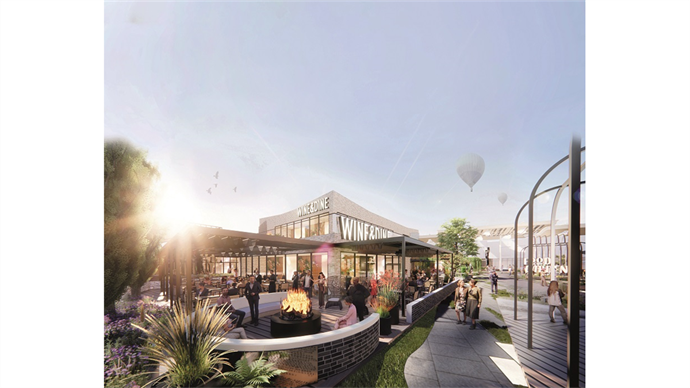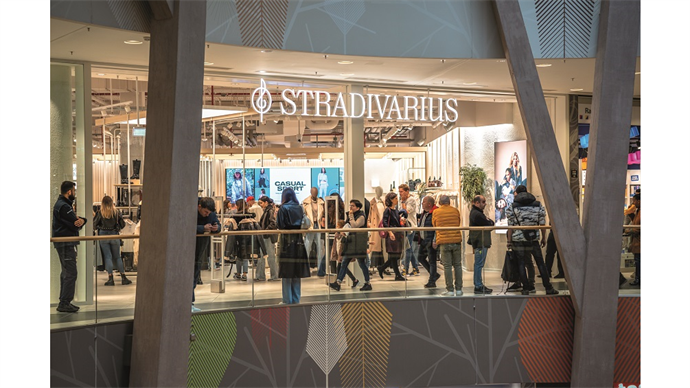Bricks-and-mortar retail has performed well this year despite the challenging economic environment. In a Q&A interview with PropertyEU, Joanna Fisher of ECE Marketplaces delves into the reasons behind its stability and resilience.
Shopping centres have maintained a high level of stability throughout the crises of recent years and are demonstrating very positive development – despite the ongoing challenges for retail real estate, such as the effects of the coronavirus pandemic, inflation and energy cost increases, increasing ESG requirements and changes in consumer behaviour.
In an interview with PropertyEU, Joanna Fisher, CEO of ECE Marketplaces, explains why that is, what benefits they offer tenants and how ECE Marketplaces is developing the properties it manages together with its investors so that they remain competitive and fit for the future.
PropertyEU: Another difficult year is coming to an end. How would you sum up 2023? Are you satisfied with the development of the shopping centres you operate?
JF: It is true that these are still challenging times and circumstances. But despite the energy crisis and inflation, bricks-and-mortar retail has picked up considerable momentum again. We are satisfied with the performance of the shopping centres. This is particularly evident in the sales of tenants in our centres, which increased by 15% compared to the previous year. And there was also an increase in sales compared to 2019. Our centres in Turkey, Poland, Italy and the Czech Republic recorded a particularly high increase in sales. This positive development clearly shows that retail real estate is a stable and resilient asset class.
PropertyEU: How is this positive development reflected in existing and potential tenants?
JF: We achieved a strong letting result this year and were once again able to conclude more leases than last year. By the end of August 2023, there were 1,700 international contracts for a rental area of 580,000 m2. In the process, we were able to bring on board new tenants and concepts, such as the first Stradivarius store in Germany in the Milaneo shopping centre in Stuttgart, as well as extend many existing contracts with our lease partners. This positive letting result shows that many retailers continue to see shopping centres as attractive and relevant retail locations and are expanding there.
PropertyEU: What do you think makes the centres so attractive for tenants?
JF: In addition to uniform, professional management and good footfall, tenants benefit from the flexibility in particular. Shopping centres can be constantly adapted to changing customer wishes and the requirements of retailers. Many retailers have a need for and interest in larger spaces, and we can offer them this or make it possible for them by flexibly adapting space in the centre. In addition, tenants also have the option of renting pop-up space, as well as space in the walkways, which is ideal for start-ups or for testing new concepts, for example. This flexibility makes shopping centres attractive for large international brands as well as for start-ups and local heroes. In addition, there are opportunities for expansion. For example, as part of its expansion into Germany in 2023, the European retail chain Pepco signed numerous leases for new stores in ECE shopping centres.
PropertyEU: Despite positive sales, bricks-and-mortar retail is very much in competition with e-commerce, and customer wishes are constantly changing. What are you doing to ensure that your centres remain competitive and thus fit for the future?
JF: In addition to good location and professional management, the decisive factor for the future of retail real estate retail is, above all, continuous development. For us, this means always being up to date and continuously adapting what we offer to customer requirements. Optimising, modernising or even repositioning, and doing so precisely to suit the location and customer structure. A key success factor here is the further development of the sector and tenant mix, as well as the addition of further offers and new concepts that go beyond the classic retail offering. In this way, we keep the locations relevant and continuously develop them into the vibrant marketplaces we aspire to.
PropertyEU: What does further development of the sector and tenant mix look like and why is it so important?
JF: Bricks-and-mortar retail is and will remain the heart of shopping centres. However, we recognise that complementary offerings such as restaurants, entertainment, leisure and non-retail are becoming ever more important to increase the attractiveness of centres for visitors and strengthen their role as a central point of contact for shopping, services and leisure. This is because additional offerings create new reasons for visiting and open up new target groups. That allows the various uses to complement and enrich each other. The key for us as centre managers is to find the right mix of uses for each location and to give the centre a clear orientation. As convenience shopping centres with a focus on local supply and daily needs, or as destination shopping centres with a focus on strong brands and a shopping and leisure experience, for example.
PropertyEU: In your opinion, what additional offerings have a lot of potential?
JF: Culinary offerings are still an important component and thus also provide a lot of potential to increase the quality and duration of visits in future and to increase footfall in the process. That is why many centres are investing in new culinary concepts, such as the Main-Taunus-Zentrum near Frankfurt am Main. A new lively and urban centre with a high-quality, varied range of food and drinks on offer– the “Food Garden” – is currently being built there on an area of around 7,000 m² in the middle of the open-plan, open-air centre. Entertainment and sports offerings also increase the attractiveness of centres, as is the case at our centres The Playce in Berlin and the G3 Shopping Resort Gerasdorf in Austria. A new sports and outdoor adventure area opened at the G3 this summer, with numerous new retail, product testing and experience areas. In addition, we also see a lot of potential for complementary uses in the non-retail sector.
PropertyEU: What exactly do you mean by non-retail?
JF: By non-retail, we mean offerings that can be ideally combined with shopping, such as in the areas of health, work or living. From our point of view, offerings in the health sector such as doctors’ surgeries, outpatient clinics, laboratories or medical supply stores are particularly interesting. Establishing location-appropriate non-retail offerings opens up new opportunities for visits and new target groups, which is a win-win situation for investors, as well as new and existing tenants. As this approach is not suited to all centres, we always carry out a quick check first to see whether the available space is at all suitable for the use of non-retail offerings. It is only after a feasibility and market study that implementation and, ultimately, leasing of the space begin.
PropertyEU: Finally, let’s move on to the important topic of ESG. What role does sustainability play for ECE and what exactly are you doing to help achieve the climate targets?
JF: Sustainable action is of central importance at ECE and is thus an integral part of our corporate strategy. We are implementing a whole range of measures in this context – from supplying all centres with certified green electricity to converting lighting to LEDs and installing PV systems on ECE centres. We also offer investors different solutions for their respective ESG strategies. Our product catalogue ranges from an energy pre-check and taxonomy check to our energy renovation roadmap, which shows how a shopping centre can become climate-neutral by 2045. In addition, we are also involved at association level in order to learn about new requirements at an early stage and to actively shape industry standards on a political level. That is also my goal as the new Chairwoman of the European Council of Shopping Places: I want to give our sector a strong voice in Brussels and successfully help to shape the laws relevant to it, including those relating to ESG.




































